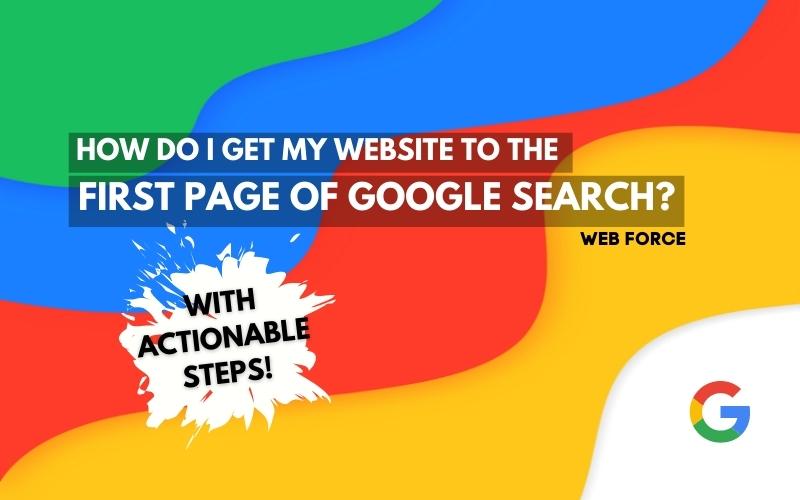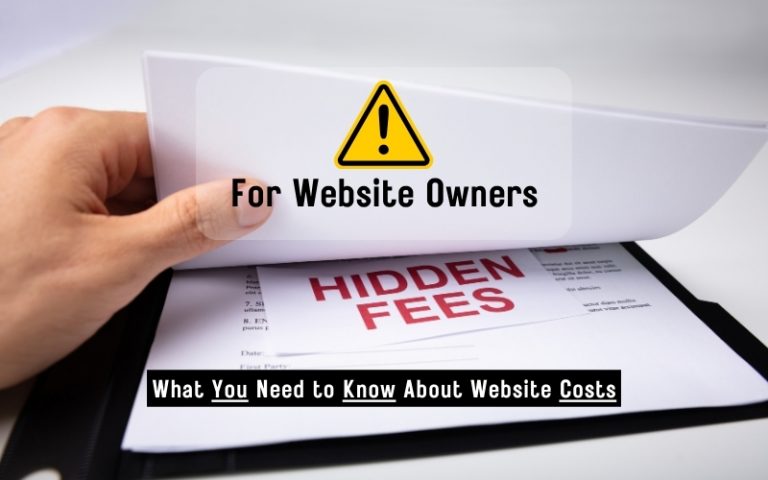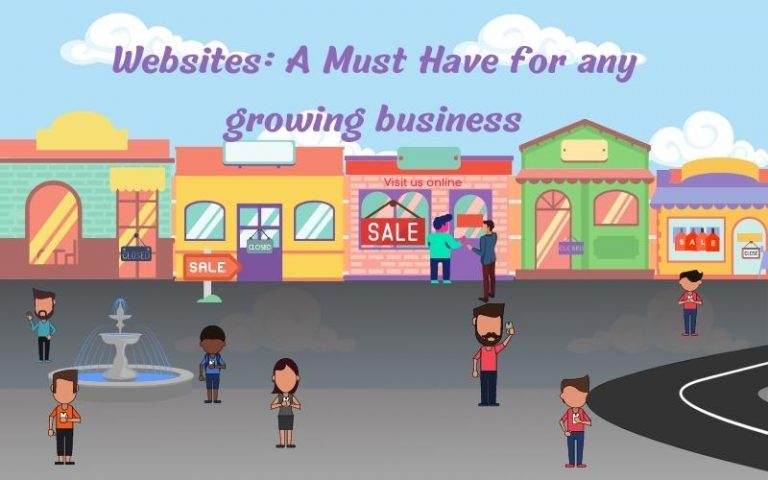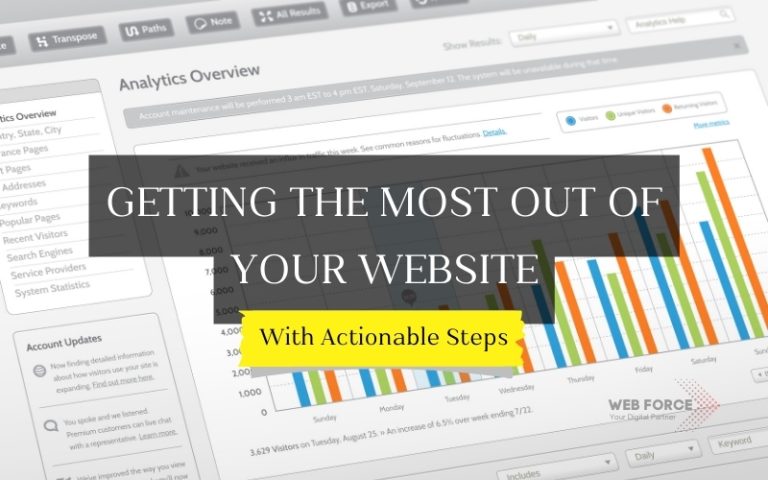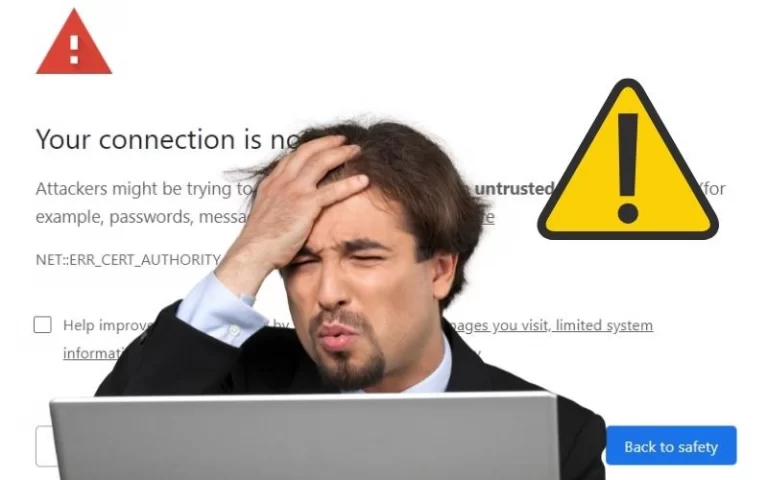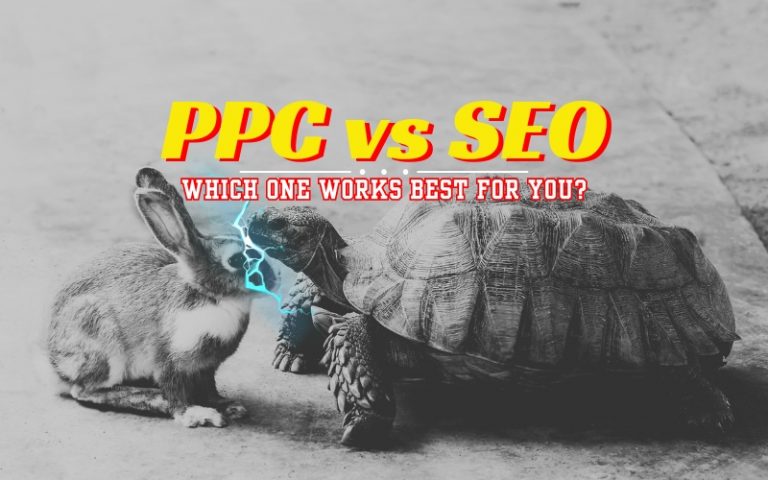[Full Guide 2025 Update] How do I get my website to the first page of Google Search?
Before we start
Unless you are paying for an advertisement, nobody can guarantee getting your website listed organically on the first page of google after a predetermined amount of time or money. That is not how search engine rankings work. However, getting to the first or second page of a search engine is possible to accomplish, and this guide will take you through the different aspects that is involved and importantly the actionable steps on how to improve them.
Introduction
If you know anything about SEO rankings, then you know that the title question involves many different aspects. For those that are new to search engine optimization, this is not a flip switch or simple set of configuration or an account that you setup.
In this article I will attempt to structure your approach with actionable tasks to getting your webpage as high on the google ranking as possible, hopefully even the first page. As many people get lost in the details and eventually give up on it or spend money on all the wrong places.
What is organic traffic vs paid traffic?
Organic traffic are visitors to your website that have found you on a search engine, social media profiles and posts or even when someone types your URL out on an internet browser directly. Naturally the higher up you are ranked on a search engine, the more likely it is that someone clicks on your website link. Likewise, the more you share your website link, the more organic traffic you get.
Paid traffic is exactly that, it is traffic generated when someone clicks on your ad. This can be from any type of platform including but not limited Google, Facebook, and LinkedIn.
Full Article Here: PPC vs SEO
What is SEO ranking?
This is a fundamental question that many overlook in more traditional approaches to business. If you are intending to eventually grow your business regardless of the industry, this is going to be important.
SEO or Search Engine Optimization is tweaking your website to be easily found on a search engine like Google naturally through specific keywords. Think of a car that you plan to tweaking its overall performance, there are many different things you can do. From tyres, suspension, air intake to more advanced configuration to the onboard computer chip. So, to are there many different things that work together to improve your search ranking.
Similar to a car, you can do one or more of these improvements or just look at those that are within your budget.
Why do I need SEO?
As you may have guessed, it is to be easily found on a search engine. But more than that, it’s core purpose is to direct people who are looking for what you have to offer to you. That is the bottom line (of SEO).
For example, if you run a hair dressing salon in Gotham City named Harley’s Hair Salon, if someone types Harley’s hair Salon, you will appear high up on the search ranking given your name uniqueness. However, to fully benefit from SEO, if someone types hair salon in Gotham City or near me, you want to be found as well. The latter search is a more likely typed search option for most people in that region and that is the goal of SEO.
So, you would want people to find you when they intend to visit a hair salon and not only when they search your name. Buyers’ intent plays a key role in this. This means that you generate traffic from people who are already interested in what you have to offer.
On-page vs Off-page SEO
On-page SEO are tasks that are conducted directly on the website while off-page SEO are tasks which are done outside of the website environment. An example of on-page SEO is editing your home page content on your website while an example of off-page SEO is posting about your business on Facebook. All of the ways discussed below will either be on or off page SEO related tasks.
10 Ways to improve your SEO ranking – Summarized

Below is a list of the different high-level aspects that influence your SEO ranking. Each will be discussed in detail with actionable steps in the following section. They are not in order of importance.
1. Website content
This is the content you have on your website like media and text. This includes the structure of the content you have on your website.
2. User Engagement
This is how users behave when they view your website.
3. Backlinks
Backlinks are when your website URL is listed on someone else’s website. For example, listing your website on an online directory.
4. Citations
This is your business details matched against those on other websites. For example, your contact details and location. These should be fairly similar.
5. Mobile Friendliness
How well your website looks and performs on mobile devices.
6. General Performance
How quick and efficient is your website loading speed on any device.
7. Security
This is how well your website conforms to accepted security standards.
8. Consistency
It’s a mixture of some of the above but generally means that your website is being updated and maintained with relevant content within your niche.
9. Competition
Not something you really have control of but is just as important. Your competitors are also looking to optimize their search engine performance.
10. Domain Reputation
How new your domain is and how as it been used thus far. This includes mailing from this domain. This is not just a result of the above as the domain can be used for mailing and redirections which could be misused or through misconfiguration.
If you get these 10 things right, you pretty much covered 99.99% of all you need to. You also may have heard about keywords, key phrases, site crawling, Google snippets and other SEO related terms. These will all fall under a category above and will be discussed below in more detail.
10 Ways to improve your SEO ranking – Detailed
1. Website Content
Having lots of content on your website is a start but far from enough. The content needs to adhere to certain key rules listed here:
1.1. Content
You must first have content. Having a website with just basic information about you or your business is not enough. You must go beyond contact details, location, and a few pictures. It should contain information about what is it that makes you better than your competitors, some information about how it is you operate or produce goods and more. You can even go on to create articles related to what you offer as I have done so with this article.
1.2. Theme (niche)
Your website must have a common theme and have information related somewhat to each other. An example is if your website is about skincare products, you may have information about hair care products or even pamper spa treatments. You don’t want to have completely unrelated information about stationary or the reason for raising fuel prices. If your passion extends to more than one theme, then start another website or try to find an overarching theme that connects them all.
1.3. Keywords or Key Phrases
Earlier I mentioned buyers’ intent where a search engine would return results based on what they input. Using the same example, if your website is about your hair salon located in Gotham City named Harley’s Hair Salon, more people would type hair salon and location rather than the name of the salon. Therefore, some of the keywords and key phrases you would want to include are:
a) Hair salon, Hairdresser or Beauty salon.
You do not need to include all of these. The reason for this is that the search engines algorithm tries intuitively to determine the buyer’s intent. So, whichever your website is optimized for, it will rank you for which ever term a user enters into the search engine. Terms will overlap with one another, and some will be given more of a priority. You may be ranked lower for beauty salon because this encompasses nails, facial treatment, and skin care as well. Likewise, you will be ranked higher if someone entered hair salon. So, choose your keywords carefully.
b) Gotham City
A location is almost mandatory for walk-in businesses. This is so search engines can deliver people near you to your website listing. Again, there are algorithms in place to identify when people, in your area enter “hair salon near me”. The search engine tries to determine the persons location and serve results based on that.
If you are competing tightly for business within your niche within the online space then finding good keywords or phrases can be a challenge. As more businesses grow, this will be a common challenge and to overcome this, more detailed or long tail keywords should be used. example “hair salon with covered parking” or “unisex beauty salon in Gotham city”.
1.4. Quality
It must be of good quality. This means that if a person comes to your website, it should provide them with some value. Google has intelligent algorithms to detect if your content has been spammed with certain keywords to try to manipulate SEO to get traffic. Spamming keywords and key phrases will actually hurt your search ranking. Quality goes beyond what a user reads but how it is presented as well. That means including tables, images, and videos when possible.
1.5. Structure
The structure of your data is very important. As humans go through information and visually look at bold headings, bullet points and text boxes, AI tries to do this by identifying heading tags (< h1 > < h2 > < h6 >), lists (< ul > < li >) and a whole list of other html tags. To add to this, there is also a schema markup structure that search engines read to try to understand the content on your website. Here is an example:
If you have a recipe or cooking blog, you will want to include information about a certain recipe like
- Ingredients
- Cooking time
- Step by step instructions
- The number of people it will serve and so on.
You can find the different schema types over at https://schema.org
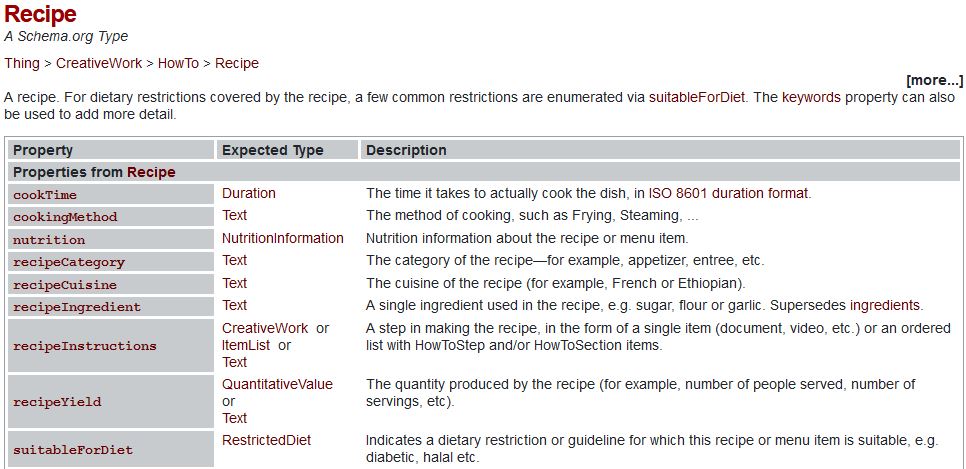
1.6. Special Category Content Type
Your Money or Your Life or (YMYL) type content are website themes that will have consequences to the viewers money or life. Money means anything that may influences a person’s financial decision like banking, investing or cryptocurrency and life means directly related to a person’s physical or mental well-being. Should your website contain content related to these important categories it will need to adhere to more stricter rules. Three (3) main areas have been defined by Google. Expertise, Authoritativeness and Trustworthiness (E.A.T). Googles algorithms accesses your website to meet these criteria. If it does not, then you will be ranked very low or not at all on google. Google polices tend to get updated regularly to keep up with an evolving internet, but one thing remains certain, if your website is classified as YMYL type content, extra care must be given to all aspects mentioned here, specifically, E.A.T.
1.7. Media
Include media to supplement your written content. When adding images and videos add alt-text. This helps the search engine understand the purpose and description of the media in relation to your content. Apart from that, it helps viewers know what the image is about if they are not loaded.
1.8. Be Original
And lastly when it comes to content, do not steal, or plagiarize from other websites. It’s easy and tempting but search engines have no trouble detecting plagiarized information. To oversimplify how this works, when content is added to a website, it is crawled and cached on let’s say the Google servers. This means that a version of your content is temporarily stored on Google which makes it easier to deliver search results when someone uses the search engine. So, when google sees more than one website with the same content, it recognizes the first copy as canonical (original or official) and all others as a copy. Search engines regularly scan for new data and when a website has been updated, it is updated on the search engine cache soon after. Having information that is regarded as a copy hurts your SEO ranking. It’s better to be original with lesser content then unoriginal and lots of copied content. The definition of copied information can have a grey area.
When it comes to written text, plagiarism is considered a word for word copy. So, rewording something you found on the internet is recommended. With media, these are increasingly more easier to detect similar or copied content using advanced AI. It is best to make significant changes to these before using it on your website.
2. User Engagement
When users reach your website, how engaged they are is important as this tells search engines whether the content on your website is of any value. Engagement is determined by clicks within your website, buying something from your website, scrolling and if you have interactive content then interactions with that. The time spent on your website is also an important factor.
If users leave immediately after coming to your website or just spent a few seconds and left, this is considered a bounce. The higher the bounce rate the lower your overall score. Put simply, if ten people come to your website and six of them leave shortly after, then your bounce rate is 60%. There are a few other factors that will affect this rate but generally this is how it is calculated.
3. Backlinks
Backlinks are a link to your website on someone else’s website. This can be any link to any page on your own website on an external website. Google specifically treats this like a ‘vote’ as if an external website is saying you have content of value. This is one of the key factors of Google search ranking versus other search engines. Other search engines now also adapt this technique though not as advanced or popular as Google.
Over time a website builds a certain reputation if managed well. This includes all aspects mentioned in this article.
Two popular online providers measure the overall quality of a website, this is Moz which measures the DA (domain authority) and Ahrefs which calls it DR (domain ranking). They both serve very similar purposes but the algorithms used to calculate the score are different. The higher this score, the more weight a backlink carries. As an example, it is better to have 2 backlinks from websites with 60+ DA than 100 websites with under 10 DA.
There is also such a thing as bad backlinks as well. This is where your website link is spammed across one or more external websites. Of course, you may not have much control over who backlinks to you however you are not totally powerless here. You can easily disavow those backlinks for free if you are the webmaster of your website. This tells Google to ignore the backlinks from these websites.
This must be used with extreme caution of risk lowering your ranking.
Read here on the steps by for Google: https://support.google.com/webmasters/answer/2648487
To get backlinks you would need to engage with other websites in one way or another to contribute meaningful content either by asking them to link to content you have or by giving you a shout-out which is often sometimes a paid service. Other than that, contacting directory services to have you listed is another way to get backlinks.
As your website grows and gains traffic, there may be others who would choose to link back to your content as it provides them with value in some way.
4. Citation
On the topic of directories, citations help search engines better understand you. If your business is listed on many directories with matching details, this reinforces your website details. Of course, you would want to beware which directories you choose. You do not want to list your hardware business on a food network directory as an example. There are many free options available.
For more directory services, read this article: https://webforce.co.za/here-is-a-list-of-south-african-directories/

Google also has their own business listing service called “Google My Business” and it can be quite powerful. This was recently integrated into Google Maps but serves the same purpose. It’s easy to setup and also free, however verifying your business which is a key factor can be a bit tricky depending on your region.
This service is exclusive for businesses with a physical premises. However, if are running a business from home you might be able to get away with adding your home address. This is helpful to curb fraud but on the other hand more and more businesses operate from home or exclusively online. That is why it is important to diversify your listings to other websites as well.
5. Mobile Friendliness
Over 77% of internet users in South Africa use internet on their mobile device and this number is only growing vs 21% of desktop internet users. This ratio and trend are fairly similar across the world. So, it only makes sense that your website should be mobile friendly. Search engines, specifically google has mobile bots, which scan your website to determine how user-friendly your website is. Google will then notify you of any issues and if not resolved, your SEO will be impacted.
Reference: https://gs.statcounter.com/platform-market-share/desktop-mobile-tablet/south-africa
6. General Website Performance
This is a technical requirement that requires significant attention before your website is even built. There are a few questions you should ask yourself to determine what you should get.
6.1. Who is my intended audience for the website?
Of course, if you are a small business serving a small region, a simple solution should do. If you serve a country or many countries, then you would need to pay more attention to your initial website solution.
There are other factors to consider apart from region, like are you a school or university. This could generate lots of traffic on its own though it’s a small region.
Lastly, keep the end goal in mind. You want to get a solution that can scale up as you do. If it is a personal blog and has a fairly low audience reach, then it would not matter as much.
6.2. What type of content and features will I have on my website?
The more content and features you have on a website the more resources required. When a webpage loads, it must load the media, HTML, styling files that tells the website how it should look and JavaScript which tells the website how it should behave. This loads for every basic modern website so the more content and features the longer it takes to load. Some websites have other non-standard content that loads for specialized content features.
Therefore, it is important to understand your requirements when building a website.
6.3. Who will be building my website?
Based on your skill level, different tools will be required to archive the same results which means it will impact your budget. As this is a highly technical task, learning how to archive higher performance at the lowest cost requires months or even years if you do not have the technical backend knowledge.
Large companies like Wix or Square Space makes it easy for anyone to manage and grow their website however this comes at a very high cost.
You could also acquire online services like CloudFront or Cloudflare to boost your website performance. Cloudflare is a free service with paid options which you can reap the benefits of and does not expire. They make their money from even higher performance options or their other add-on services.
If you would rather have a web agency like Web Force manage this, it is often much cheaper. The trade-off is that you have to rely on an external party to manage your website. If you are comfortable with that and don’t want to get your hands dirty this is a good option for you. Some companies may offer hybrid option however this should be reserved if you or your team have technical knowledge.
6.4. So why do search engine consider performance?
At first glance it may seem more favourable to those who can afford it. This is only partially true, yes you can through money for better resources but there are ways to improve performance by other means through optimizing existing resources. Optimizing HTML, CSS, JS scripts, reducing image sizes and removing unnecessary files can all improve performance.
If you searched for something on Google, you would want to find a website that provides you with exactly what you are looking for and not have to wait through long loading times.
So, if you spent the time and money for a good performance website, Google would reward you.
Good performance on a website ultimately adds value with a pleasing user experience.
7. Security
It goes without saying that this is an important factor for ranking high on a search engine. Also, a technical requirement but slightly more straightforward than performance. Apart from having an SSL certificate that allows your website to load using https, security is closely linked to the platform you have chosen to build your website on. This is because each platform has their own security vulnerabilities, and the webmaster needs to be knowledgeable enough to apply necessary hardening configurations. The threats that exist are constantly evolving and so to must the websites software which needs constant updating.
In some cases, the mail server is separate from the web server. You need to ensure that both servers are secure. As an example, should your mail server get hijacked and used to send out spam, this impacts your overall domain reputation.
There are many free tools you can use to scan a website here are some we use.
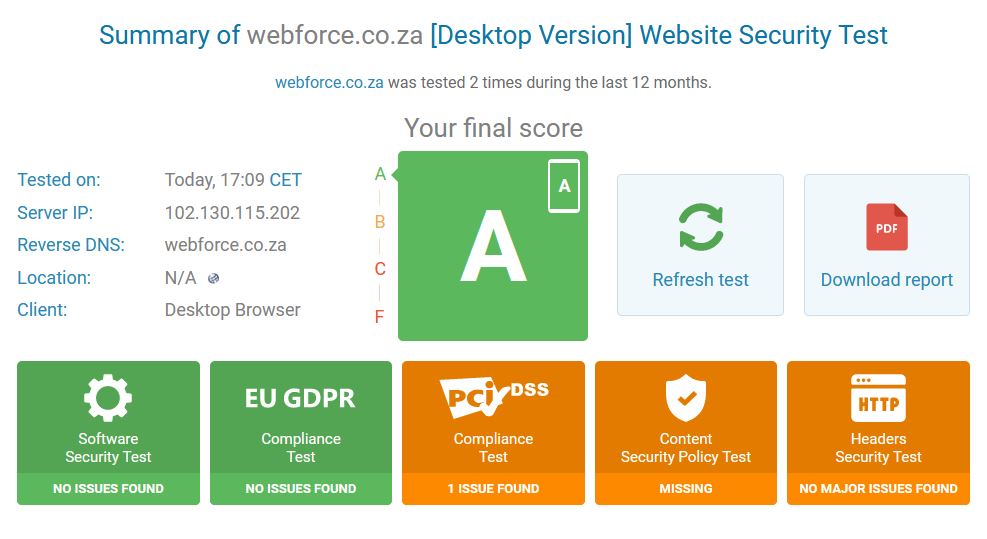
https://pentest-tools.com/website-vulnerability-scanning/website-scanner
https://www.immuniweb.com/websec
If your website has intrusive pop-ups and redirecting users to grey market websites, your SEO ranking will hurt.
8. Consistency
As with anything you try to build in life, consistency in all areas is key. Reevaluate and improve your performance and security. Keep uploading new content for viewers to keep them engaged. All search engines prefer serving up to date content if all else are equal.
This means taking the time at least once a month to refresh your website.
9. Competition
Chances are your competitors are also doing what they can to get ahead. Don’t let this deter you as competition drives innovation and creativity in all areas. But before you even get there, ensure you are doing the basics in this article.
Here are two actionable tasks for this item:
9.1. Market Research
View your competitor’s websites and get ideas on what to do and what not to do with your own website. You would be surprised on what you learn. Of course, you don’t want to blatantly copy content as this will end up costing you in more ways than one.
9.2. Backlink scan
There are online tools that allow you to enter your competitor’s website and peak into who is backlinking to them. Can now have potential options for backlinks to your own website. Sometimes if a webmaster links your competitor’s website, they may link yours as well.
Here is a free backlink checker: https://ahrefs.com/backlink-checker
10. Domain Reputation
This is mainly a resultant factor of all the above. Sometimes also referred to as Domain Rating or Domain Authority however these are proprietary names at ahrefs.com and moz.com respectively. They serve the same purpose as reputation based on their unique algorithms so they will differ.
The other key factor is the age of the domain. Even for domains a year old will be considered young and affect the ranking negatively. You could compensate for the age in all other areas.
Ultimately domain reputation tells you if what you are doing is right or not. It is a strong indicator on how your website will rank.
A website with 10 points lower could still rank higher if that website has been optimized for the specific keywords entered, in the right location or if that specific webpage content has been optimized to be more engaging to uses. Therefore the domain score should be seen as a probability score vs your competitors.
What else impacts my website ranking?
This question is to point out other factors that affect your SEO ranking that you have no control over.
User personal history and data
TLDR; An individuals search preference is taken into account.
Most online activity now has some sort of ability to track an individual’s behaviour patterns, events and general activities. This is not to say that every one of these are being tracked. For example, social media interactions are tracked. If you engage with certain brands, you may see ads for those brands later on. Depending on the social platform, you can turn off these personalised ads. Your smartphone has apps that can track you as well and of course what you enter into a search engine is remembered.
This may sound malicious, however many services you use which are free to use must make money somehow and your data is generally used serve personalised ads. You should still beware of suspicious websites and apps especially when entering sensitive data.
All the types of data companies have on an individual may in some cases influence what that individual see on search engine results.
To remove your data from Google, follow this link. Note that it is not a straightforward process, and you would need to provide relevant data to prove you are the person whom data needs to be removed. There are also some instances where you will need to contact the website owners themselves. https://support.google.com/websearch/troubleshooter/3111061
Current Trends
Unusually hard to predict, online trends play a significant role in how your website is ranked on a search engine. As an example, the movie The Avengers (the first one) the post credit scene was of all the main characters in a restaurant eating shawarmas. In the months to follow, shawarma sales in New York and across the USA increased dramatically.
So how does this impact your SEO ranking exactly as a shawarma business? This would influence user behavior and more people would search for shawarmas. More people would engage with your website or business listing etc which sends signals to trackers that what you have to offer is in demand.
Similarly during black Friday, more people are searching for deals.
Government and Company policies
This doesn’t happen very often but should be on your radar. An example is of search engines algorithms which get updated to include or exclude certain criteria. In the last ten years Google algorithms has been strongly leaning towards websites that are mobile friendly.
Government policy is even more rare as companies tend to be more dominant with how their applications should be used but there have been cases in the past where legal battles have been fought prompting search engines to enforce certain restrictions.
Sanctions can also play a part in your SEO ranking. Most major search engines originate in the USA and if your country has been sanctioned for whatever reason, depending on the sanctions, your website ranking may drop of the search engine completely.
The unknown or conspiracy factor
There are conspiracies that search engines like Google and Bing manipulate search rankings that suites certain agendas. Whatever they may be. Unless they released the “source code” of the algorithms that determine SEO rankings, these shall remain in the unknown.
In Conclusion
You may be asking yourself why all this effort to rank higher on a search engine when I could spend the same money for ads. It is not about which is better between organic and paid traffic. A good strategy will employ both. However, the steps I mention that would improve your SEO ranking is actually improving the value of your website as a whole. These steps make your website more secure, perform well and give the viewer a good experience with relevant and up to date content.
This is what search engine ultimately want to provide to users. So if done right and diligently for long enough, you will start to get significant amount of traffic without paying too much on ads.
I tried to be as comprehensive as possible and to the point as it covers quite a bit of content. Even so there are many other items that could have been added here so use this guide as a strong base of understanding instead. If you would like to contribute to this article in any way or need assistance with SEO’s, please contact me at online@webforce.co.za

